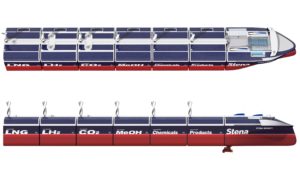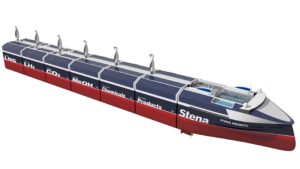Leading tanker shipping company Stena Bulk unveiled its new InfinityMAX hybrid bulk carrier concept, which pushes the boundaries of zero-carbon multimodal vessel design.
The InfinityMAX concept, which is designed to carry dry and wet cargoes in modular compartments, is built on several new core principles that, cumulatively, represent a paradigm shift in cargo transportation.
The ultra-flexible, emission-free design has been created in response to the enormous challenges that the global shipping industry must overcome in the coming decades. The design envisions a world in which the shipping industry plays a crucial role in supplying the world with renewable energy, chemicals, materials and consumables for its endless needs.
In a proposed breakthrough that could be considered as impactful as containerization was for intermodal trade of goods, the creation of standardized, modular cargo units that can transport dry bulk, liquid bulk or liquefied gas-such as methane, hydrogen or ammonia-will significantly streamline the process of transporting wet and dry bulk cargoes.
Each of InfinityMAX’s modular cargo units is designed to be completely self-sufficient in terms of energy use, with wind turbines and solar panels generating all the electricity needed for internal systems.
The modular units have also been designed to be able to be dropped off outside ports and picked up by tugboats, thus avoiding congestion and drastically reducing layover times. The InfinityMAX concept will use hydrogen as a marine fuel and wind turbines to generate more power.
Although the vessels will be manned for safety and flexibility reasons, Stena Bulk has designed the InfinityMAX concept to be semi-autonomous and meet future demand for efficient operations without compromising safety.
InfinityMAX will also improve crew welfare on board for a sustainable working environment. As a result, InfinityMAX has the potential to change the role of the crew on board, with less drudgery and more focus on supervision and interaction with operators on the ground.
 Commenting on the announcement, Erik Hånell, President and CEO of Stena Bulk, said, “We are very proud to unveil the design of our InfinityMAX concept vessel, which we believe pushes the boundaries of the future of our industry. What we are proposing here is innovative, provocative and would radically change the way we think about the bulk trade, streamlining two segments with complementary expertise into a shipping segment that is ready for the challenges of the future.”
Commenting on the announcement, Erik Hånell, President and CEO of Stena Bulk, said, “We are very proud to unveil the design of our InfinityMAX concept vessel, which we believe pushes the boundaries of the future of our industry. What we are proposing here is innovative, provocative and would radically change the way we think about the bulk trade, streamlining two segments with complementary expertise into a shipping segment that is ready for the challenges of the future.”
“The application of advanced technologies – including hydrogen fuel and other efficiency measures – means this is a vessel concept that demonstrates our core philosophy that innovation is key to commercial success, given the challenges we all face. We will continue to work closely with our innovation partners, sparing no effort to ensure that the right breakthroughs are made to make the InfinityMAX concept a reality.”
Indeed, InfinityMAX drives improved global fleet utilization and the potential for more standardized supply chains, as well as reducing the unnecessary environmental impact of empty tanks being shipped around the world in search of new cargo.
By 2050, the growing need to transport energy from areas with abundant renewable supply to areas with high energy demand – transported as hydrogen, methanol, methane and ammonia – will be a defining part of international trade.
 This, combined with the need to transport sustainable edible oils and chemicals, and carbon dioxide from carbon capture facilities, as well as bulk commodities, requires a vessel design that is up to the challenge of a radically reshaped global economy.
This, combined with the need to transport sustainable edible oils and chemicals, and carbon dioxide from carbon capture facilities, as well as bulk commodities, requires a vessel design that is up to the challenge of a radically reshaped global economy.
With the right level of mature technologies, Stena Bulk believes that an InfinityMAX vessel could enter service between 2030 and 2035. To achieve this, a strengthened and sustained spirit of collaboration between industry and technology leaders is needed in the coming years.

